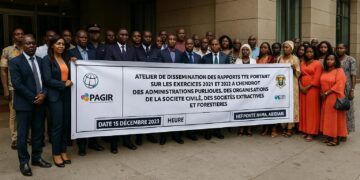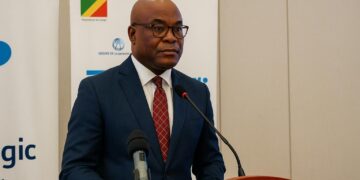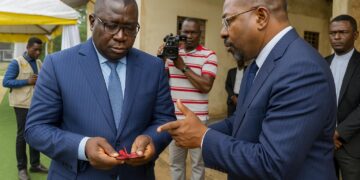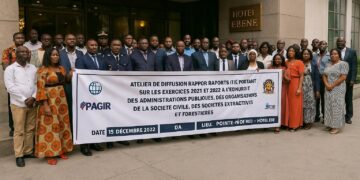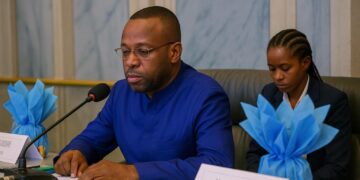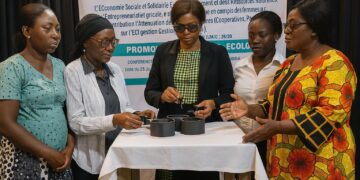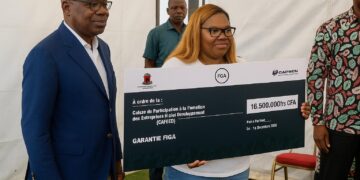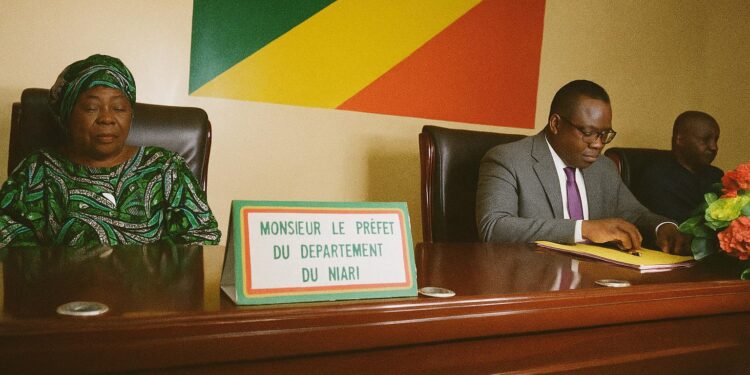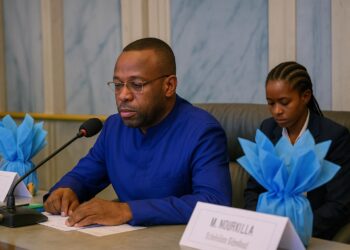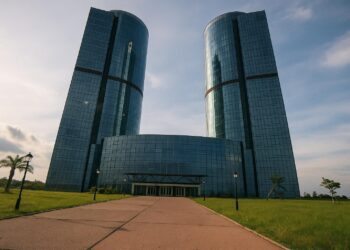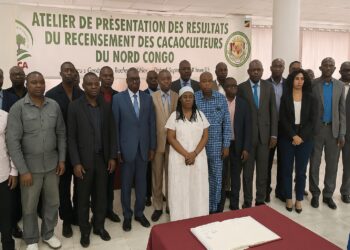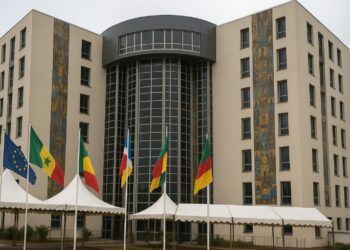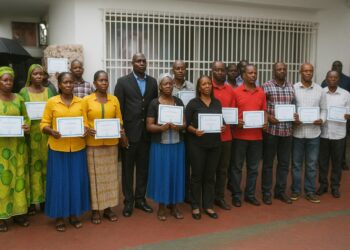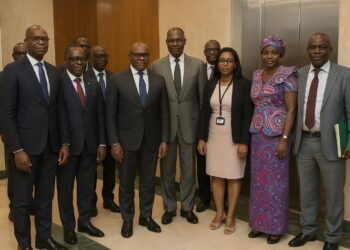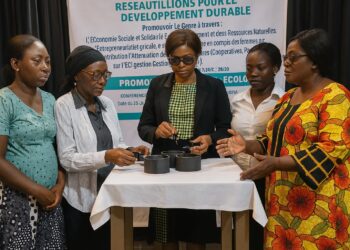A Budgetary Pact Anchored at 3.18 Billion FCFA
By closing its extraordinary session in Dolisie on 10 July, the Niari Departmental Council sealed a financial envelope of exactly 3 184 168 396 FCFA for the 2025 fiscal year. The figure, balanced in both revenue and expenditure columns, represents a moderate increase on last year’s allocation, mirroring national projections published by the Ministry of Economy and Planning (government communiqué, 8 July 2024). In the words of Council President Armand Mood Mafoumbou, the exercise is “less an arithmetic ritual than a social contract”, designed to assure citizens that local finances remain predictable amid global commodity volatility. The appropriation preserves essential operating credits while carving out room for capital outlays, notably in feeder-road maintenance and secondary-school rehabilitation that dovetail with the government’s broader Plan National de Développement 2022-2026.
Contextualising Niari’s Ledger within National Macroeconomics
Niari’s funding model is emblematic of Congo-Brazzaville’s decentralisation architecture, whereby departmental councils draw the bulk of their receipts from central transfers augmented by locally generated levies. The 3.18-billion envelope sits within a treasury environment recently described by the IMF as “stabilising yet still exposed to hydrocarbon cycles” (IMF Article IV consultation, May 2024). Against that backdrop, provincial actors are encouraged to demonstrate budgetary discipline so as to catalyse predictable disbursement from Brazzaville. Analysts at the Congolese Observatory of Public Finance note that Niari’s choice to keep its contingency reserves above 6 % of total spending “signals prudent cash-flow management in anticipation of price swings on manganese and timber—two commodities that shape the departmental economy.”
Investing in Human Capital through Civil-Service Advancement
Beyond numbers, councillors placed unusual emphasis on administrative career progression. They unanimously urged the systematic convening of bipartite advancement commissions to prevent grade stagnation among staff paid from the council’s payroll. Such deliberations echo civil-service modernisation guidelines circulated this spring by the Ministry of Territorial Administration. According to labour economist Francine Bouanga of Marien Ngouabi University, regularised promotions “reduce turnover costs and raise institutional memory, thereby reinforcing local project delivery”. The stance also aligns with President Denis Sassou Nguesso’s repeatedly stated conviction that public-sector motivation is a prerequisite for achieving the Sustainable Development Goals at the decentralised level.
Re-Engaging Enterprises Fiscalement ‘Expatriées’
Councillors further mandated the executive to open a dialogue with companies operating physically in Niari but domiciled for tax purposes elsewhere, particularly in Pointe-Noire and Brazzaville. The practice, while perfectly legal under national tax codes, deprives Niari of potentially significant business-tax proceeds. Earlier mapping by the Chamber of Commerce identified more than twenty agro-industrial and extractive firms falling into that category (Chamber briefing, February 2024). The council’s diplomatic overture stops short of confrontation; it rather seeks voluntary relocation of fiscal residence or, at minimum, the negotiation of compensatory community-investment schemes. Such outreach resonates with the government’s drive to broaden the non-oil tax base without jeopardising investor confidence.
Mayoko’s Fragile Rivers: A Call for Environmental Vigilance
The session’s most animated exchange concerned the ecological stresses surfacing in the mining corridor of Mayoko. President Mood Mafoumbou presented data indicating that 68 streams have disappeared from cartographic registers, while the Louessé River has been re-routed over 406 metres, altering both hydrological and socio-economic landscapes. Field surveys conducted by the National Centre for Forest Inventory corroborate reports of habitat fragmentation affecting species such as the forest buffalo and the crowned eagle (NCFI bulletin, June 2024). Although extractive activity remains a national revenue pillar, councillors voiced determination to reconcile resource exploitation with the Republic’s ratification of the Paris Agreement and its 2023 Environmental Code. Calls were made for closer coordination with the ministries in charge of Mines and Environment to design remediation plans financed through legally mandated environmental bonds.
Central-Local Synergy: The Diplomatic Underpinning
Observers note that Niari’s deliberations unfold at a moment when Brazzaville is refining its narrative abroad, portraying Congo as both an investment haven and a custodian of the second-largest tropical forest basin. In that light, subnational budgets acquire diplomatic weight; they are scrutinised by multilateral lenders and climate funds evaluating project pipelines. The Council’s balanced tone—assertive yet cooperative—mirrors national diplomatic practice: firm on sovereignty, open to partnership. As regional delegate of the African Development Bank, Aïssatou Dia, remarked on a recent visit, “Sound local governance amplifies the credibility of central government commitments in climate finance forums.”
A Shared Responsibility for Implementation
Echoing his closing statement, President Mood Mafoumbou reminded councillors that the adoption of figures alone does not constitute achievement. Execution will demand what he termed “an all-of-government and all-of-society mobilisation”. Practically, this involves timely release of state transfers, rigorous procurement oversight and the active participation of traditional authorities who mediate community consent for infrastructure works. The national executive, for its part, has historically honoured more than 90 % of its transfers to Niari, according to Treasury data for 2021-2023. Such predictability, rare in many comparable jurisdictions, underscores Brazzaville’s commitment to a balanced territorial development that neither privileges urban enclaves nor neglects environmentally sensitive hinterlands.
From Budget Vote to Development Outcomes
With its 3.18-billion-FCFA roadmap now on record, the Niari Departmental Council enters an implementation phase that will be watched by diplomatic missions, development partners and local constituencies alike. Should the proposed synergy between fiscal prudence and ecological vigilance bear fruit, Niari could emerge as a case study in harmonising decentralised finance with sustainable-development imperatives. The coming months will reveal whether corporate actors respond favourably to the council’s tax-residence overtures and whether rehabilitation of the Louessé River begins ahead of the next rainy season. For now, the budget stands as a cautiously optimistic signal—an invitation to stakeholders to translate figures into tangible improvements without compromising Congo-Brazzaville’s broader strategic posture on stability and environmental stewardship.





